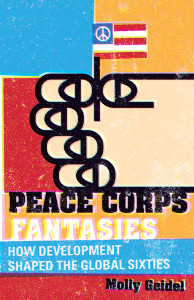What Is IN Peace Corps Fantasies? Chapter by Chapter
Dr. Molly Geidel’s book has six chapters. The first three chapters explore how the 1960s Peace Corps “embodied a radicalized, gendered vision of modernity that linked economic integration to freedom, frontier masculinity, and global brotherhood.” (If you ever wondered why you hate academic writing, now you know.)
Chapter 1 examines Peace Corps “architects’ deployment of the gendered anxieties and fantasies of postwar social science in the conception, formation, staffing, and early volunteer recruitment efforts of the agency.”
The second chapter “attempts to understand how the Peace Corps inaugurated and codified new models for relating to racial and cultural others, using modernization doctrines to revise the romantic-racist vision of rebel masculinity that captured the popular imagination in the 1950s.
The third chapter turns to the women in the 1960s Peace Corps, analyzing fictional texts about “Peace Corps girls” alongside memoirs and other nonfiction accounts by and about women volunteers. “Here I demonstrate how they were accommodated and constrained by the discourses of development, global brotherhood, and frontier heroism produced by the agency in its iconic decade.”
Chapter 4 investigates how the civil rights and Black Power movements were influenced by liberal modernization theory and the ideal of heroic development work.
Chapter 5 traces the “migrations of the gendered modernization ethos beyond the Peace Corps, delineating the agency’s relationship to both the Vietnam War and the new left through an analysis of interviews and position papers from the Committee of Returned Volunteers, a national organization of returned volunteers who formulated increasingly radical critiques of U.S. foreign policy in the late sixties.” (Confession: I was a member of CRV.)
The last chapter “chronicles the agency’s work in and expulsion from Bolivia. It surveys the network of military and civilian government agencies, religious missionaries, and other development workers that spread across Bolivia in the 1960s, and reveals how the Peace Corps came to symbolize in the Bolivian popular imagination all these modernization efforts.”

Excellent summary! Thank you, John. This is a good guide to reading and rereading, which I have to do because I get lost in the “jargon”.
I could have missed something. But, in writing about the “60s”, Dr. Geidel never even mentions that which came before; WWII, the Marshall Plan, and the Reconstruction of Japan or how the men who created Peace Corps may have been influenced by those events. Dr. Geidel also writes about the the political and civil rights movements of the “60s”, and never mentions the assassinations of President Kennedy, Dr. Martin Luther King, and Senator Robert Kennedy.
What about the Peace Corps today? Does this author’s critique only apply to the early years? The Peace Corps still exists and, like any enterprise, has modernized and adapted. Why are so many countries still eager to have Peace Corps volunteers, a demand that cannot be fully met? I travel to Honduras annually for medical and humanitarian projects and hear constant laments from all economic and geographic sectors there about the departure of the Peace Corps and questions about when it might return.
Confession : I was a member of CRV and it was responsible for creating my FBI file as J.Edgar considered RPCVs subversives.
I agree with the author, “If you ever wondered why you hate academic writing, now you know.” As a PCV of the 60s with more than 25 years working in “development”, I cannot imagine there is anything to be learned from a book that says the PC of the 60s “embodied a radicalized, gendered vision of modernity that linked economic integration to freedom, frontier masculinity, and global brotherhood.” Whatever that means! Consequently, I have no intention of reading this book. I suspect the author’s main reason for writing a book with such ridiculous views is to add it to the list of “publications” on her resume in order to enhance her academic credentials. Unfortunately, her resume will only indicate that it was written – not that it was ever read!
BDR,
Dr. Geidel is teaching American Studies at the University of Manchester. Her students, no doubt, will be reading the book. I suspect that the book will be on reading lists in many colleges and universities. History belongs to those who write it and teach it. Not necessarily those who make it.
Living members of our Peace Corps group (Nepal II) have discussed this book and agree that it reflects nothing of our motivation, experience in PC, later world outlook and occupational history (most in NGOs and foreign service concerning with improving living conditions in foreign countries; or at home). Those that are dead are probably rolling over in their graves. The language is over-blown and the conclusions ludicrous. The author would do well in the Republican presidential reality game, were she an American citizen. She could out-Trump, Trump!